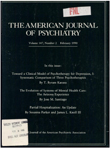The dexamethasone suppression index: enhancement of DST diagnostic utility for depression by expressing serum cortisol as a function of serum dexamethasone
Abstract
The authors sought to determine whether the performance of the dexamethasone suppression test (DST) could be enhanced by expressing cortisol as a function of dexamethasone. Because cortisol concentration is a function of the reciprocal of dexamethasone concentration, this relationship was approximated by calculating the product of cortisol and dexamethasone as a dexamethasone suppression index. Preliminary assessment of test performance measures (sensitivity, specificity, and predictive power) showed that use of the dexamethasone suppression index was an improvement over the use of cortisol levels alone. Factoring dexamethasone levels into post-dexamethasone cortisol level measures may enhance the utility of neuroendocrine assessment in psychiatry.
Access content
To read the fulltext, please use one of the options below to sign in or purchase access.- Personal login
- Institutional Login
- Sign in via OpenAthens
- Register for access
-
Please login/register if you wish to pair your device and check access availability.
Not a subscriber?
PsychiatryOnline subscription options offer access to the DSM-5 library, books, journals, CME, and patient resources. This all-in-one virtual library provides psychiatrists and mental health professionals with key resources for diagnosis, treatment, research, and professional development.
Need more help? PsychiatryOnline Customer Service may be reached by emailing [email protected] or by calling 800-368-5777 (in the U.S.) or 703-907-7322 (outside the U.S.).



